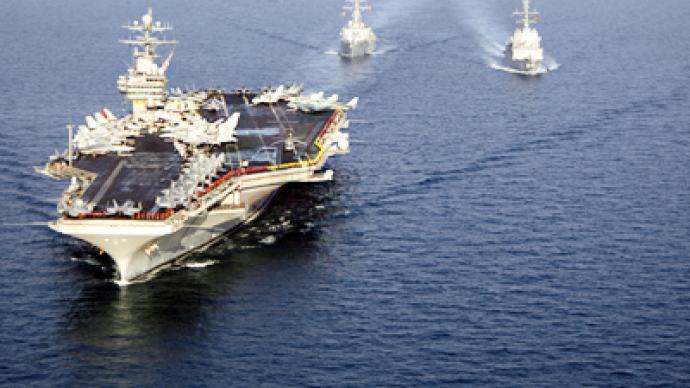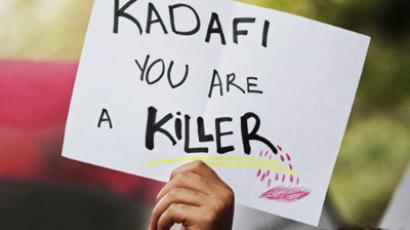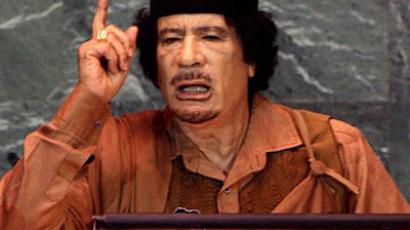US invasion of Libya?

The US Sixth Fleet has begun repositioning its ships in the Mediterranean, triggering speculation of a NATO invasion of Libya.
On Wednesday two US military ships heading towards the Libyan coast entered the Suez Canal.It comes as Libya's long-time leader Colonel Gaddafi remains besieged in the capital Tripoli, with opposition forces nearby.Gaddafi’s forces have taken over two towns to the east of Tripoli, Al Arabiya News Channel reports.Also, a series of blasts rocked Tripoli on Wednesday morning. According to reports, a truck with fuel exploded.The UN is calling for a mass humanitarian evacuation for people caught up in the crisis.The 'Telegraph' newspaper claims “British Special Forces are already in Libya.” The daily newspaper reports that the Pentagon is to call upon them to secure several tons of mustard gas and other potential chemical weapons thought to be stockpiled in Libya.After the US Secretary of State Hillary Clinton said that “nothing is off the table” when it came to Libya, the American Navy started to take tactical positions off the coast of that North African country. At this point, the possibility of any of the major forces in the region, like US military, NATO troops or even UN peacekeepers, setting their feet on Libyan shores should not be ruled out.This was mirrored by the comments of British Prime Minister David Cameron who has said that he would not exclude the use of the military there, and that there is a possibility that Britain could provide arms to the opposition forces. He also said he would support a no flight zone imposed over Libyan territory to stop Colonel Gaddafi’s jetfighters from making air strikes on military installations seized by the opposition.“We do not in any way rule out the use of military assets,” said British Prime Minister David Cameron. “We must not tolerate this regime using military force against its own people.”It must be noted that NATO’s Secretary General has repeatedly stressed that NATO would not interfere in the situation in Libya unless the UN adopts a resolution to do so. Getting such a document, however, looks like an impossible task because Russia and China have already vehemently opposed any kind of outside interference in Libya and say the resolution will definitely be vetoed.Western politicians are also playing a “weapons of mass destruction” card, saying the Libyan regime might have stockpiles of chemical weapons, despite the fact that Libya officially refused to continue the development of chemical weapons and signed international treaties accordingly.In any case, possible external military interference in Libya might seriously damage the relationship between the Arab world and the West.“This is very ugly, this return of humanitarian imperialism ,” believes Asia Times correspondent Pepe Escobar, who said that if sanctions against the Gaddafi clan are ok, then the NATO-US intervention in Libya already been openly discussed in Brussels would be a disgusting thing, but “it cannot be ruled out for the moment.”The violence in Libya is continuing. Heavy weapons are allegedly being used against armed anti-government forces. The opposition insists that though it is armed, their weapons are nothing in comparison with the regular army still loyal to Muammar Gaddafi. There are rumors of a food crisis in the country as the price of rice in Tripoli has allegedly risen by 500 per cent, and food shortages are on the horizon.Amidst the bloodbath in the country, Colonel Gaddafi has said that his people love him and are ready to die for him and Libya. Gaddafi is reportedly remaining in Tripoli.
Oil & hypocrisy “just beyond belief”
Is history repeating itself? This time, Libya – in 2003, it was Iraq.Trends forecaster Gerald Celente says it is not support for the Libyan people, but interest in the country's vast oil fields that is driving US rhetoric.“The only reason they are interested in Libya is for their oil. Do you hear anybody screaming and yelling here about all those people that were killed last week on the Ivory Coast or in Sudan?” Celente questions. “We already heard Hillary Clinton say that they are willing to do anything for anybody in Libya that needs aid.”Gerald Celente says the hypocrisy is “just beyond belief” and the western world is calling for the head of Gaddafi but not for the head of any other leader from rioting countries like Egypt, Bahrain, Tunisia or Yemen.“Why? Because it is oil. You think we’d be in Iraq if the major export there was broccoli?” exclaimed Celente.
Libya has the largest proven oil reserves in Africa, at more than 3 per cent of the global total – and there could be a lot more undiscovered.Libya is not the only African nation in turmoil. Somalia’s drawn-out conflict has been called ‘a slow genocide’. But there’s little sign of US or European military input. And it is a similar story on the other side of the continent.“There are events unfolding in the Ivory Coast where there is also an armed conflict between rebels and the government, but nobody seems to be thinking of that,” said John Laughland from the Institute of Democracy and Cooperation. “It’s only because fashionable attention is focused on Libya – oil but also for the political implications of the Middle East as a whole. We all know that the West including Britain has got its hands very dirty with the Libyan leadership over the recent years.”John Laughland told RT that the current situation in Libya does not merit military intervention. “The level of violence in Libya is relatively low,” he said. “I mean, we believe that there have been several hundred people killed, but it is not a huge level of violence. It certainly is not the global level of violence that would normally merit intervention.” “I think that parallels do, though, lie with these other interventions made because clearly, Libya is an important state and the West does want try to establish some sort of control over the situation. It is because it wants to recuperate the situation, it wants to muscle in and appropriate to itself developments it did not initiate,” Laughland added.
The lessons have not been learnt when it comes to Iraq, which remains unstable even now, with only feeble growth of the much-vaunted democracy that the US tried to plant there. Allied troops are equally bogged down in Afghanistan, with no convincing timeline for withdrawal, and an ever-rising death toll.According to peace activist from Stop the War Coalition John Rees, a NATO invasion in Libya would have disastrous consequences. “Colonel Gaddafi says that the revolution is a mask for foreign involvement,” he said. “If the imperial powers actually do intervene it will make it look as if he is right, and that will be a disastrous turn of events for revolutionaries who are trying to overthrow him.”“I was recently in both Tahrir Square in Cairo and in Tunis and I think that the western powers have to be very clear that the last thing that the people who topple their dictators in the Middle East want is the intervention of the Western powers,” Rees added.“The mess that has been made in Afghanistan, the terrible disaster that was caused in Iraq shouldn’t be visited on any more countries in the Middle East,” John Rees concluded.
Carol Turner, an anti-war activist, agreed that while the majority of Libyans may want a regime change, they do not want to see it achieved by foreign intervention.“I’m extremely worried there could be a foreign intervention led by the US and Britain,” she said. “I think it’s very difficult for them. But on the other hand if they feel that this is the only opportunity of toppling Gaddafi and installing a pro-Western regime, or if they feel that their oil interests and other their strategic interests are in some way threatened – then I think they ultimately won’t hold back.”
According to British Labor MP Jeremy Corbyn, the scenario that unfolded in Iraq is now very likely to repeat itself in Libya.“It is looking quite possible that [key NATO members] will launch an attack, with or without UN approval, so we are looking almost at a repeat of what happened in Iraq and indeed the results, I suspect, will be largely the same,” he said.Corbyn added that the reason why the West has suddenly become deeply concerned about human rights in Libya is solely the country’s oil.
US radio host and peace activist Ralph Schoenman said that the US is currently implementing its long-standing plans to invade Libya.“What they want to do is to put foreign forces in place to determine the outcome and to abort a popular uprising that seizes control of Libya’s natural resources for the benefit of the working population,” he said.“What US imperialism is now doing is seizing the opportunity to put into place long-standing plans for invasion and intervention,” Schoenman added.
Eric Stoner, editor of the "Waging Nonviolence" website, believes that any military intervention by the West could be a huge disaster.“It is likely to lead to a dramatic escalation in terms of loss of life,” he said. “Gaddafi has shown his willingness to kill far more of his own people than Mubarak in Egypt. Sending in US and Western troops or bombs is only going to increase the destruction.”He also pointed out that there is no such thing as a quick military intervention. “History has proven that it is just not the case – look particularly at Iraq and Afghanistan,” he said. “Look at where we are now: many years of war, hundreds of thousands of people killed, and there is no end in sight for those interventions.”
And American and European governments should not look for backing at home either. Up to a million protestors marched in London over the invasion of Iraq in 2003. And times have changed. This is now austerity Britain, where starting another war was not factored into the budget.British troops are already fighting an unpopular war in Afghanistan. It is highly unlikely that the public has the appetite for getting involved in someone else's struggle again, battling as they are at home in the face of deep cuts and rising unemployment.The Ministry of Defence has to slash spending by more than US $7.5 billion in the next four years. So this is an intervention that Britain would find hard to afford, on many levels.
Dr. Franklin Lamb, director of Americans for Middle East Peace, doesn't think foreign invasion into Libya is inevitable, but doesn't rule out a military operation: "The American position now is pretty clear: they want to remove Gaddafi. If they can do it with the specific operations force, with drones – so, be it. It may well be that a massive invasion force is launched", says Dr. Lamb
Journalist and social worker Ken Olende says the US and UK certainly do not want to put the troops on the ground. “There are dangers for them in getting involved in what happened in Iraq and Afghanistan… But I think there’s a high danger they would try and get involved not by putting troops on the ground, but by putting on other kinds of military pressure,” Olende said.
Meanwhile, political expert Mahdi Darius Nazemroaya says that US wants to appropriate Libyan oil, and that operations have already begun. “Foreign intervention can only exasperate the problem in Libya. It cannot help it in any way,” he declared. “As a matter of fact, the foreign intervention has already begun. The French, the US and the British have already sent so-called humanitarian aid to Benghazi, but they have also sent military advisers and Special Forces. This means that the operation has already begun.”
Mike Ferner, national president of Veterans for Peace, argues that the Senate’s non-binding resolution calling for the United Nations Security Council to impose a no-fly zone over Libya could be seen as an act of war.“This is not even echoes of Iraq, it is even more outrageous,” he stated. “The whole thing sounds way too familiar. There should be no US military intervention, no British military intervention, there should be no NATO military intervention. If the United Nations determines that some sort of mission there is necessary, then that is up to the Security Council, but the US should not even be even making noises, because that is only going to make things worse.”














